- Commodities jump on prospects of Russian exports ban
- Inflation concerns push euro lower
- Treasuries fluctuate
- Japan reports GDP on Tuesday.
- US JOLTS Job Openings are reported on Wednesday.
- On Thursday the ECB publishes its interest rate decision.
- The STOXX 600 fell 3.8%
- Futures on the S&P 500 fell 2%
- Futures on the NASDAQ 100 fell 2.1%
- Futures on the Dow Jones Industrial Average fell 1.9%
- The MSCI Asia Pacific Index fell 1.7%
- The MSCI Emerging Markets Index fell 2.4%
- The Dollar Index rose 0.4%
- The euro fell 0.6% to $1.0866
- The Japanese yen up 0.3% to 115 per dollar
- The offshore yuan was little changed at 6.3241 per dollar
- The British pound fell 0.5% to $1.3154
- The yield on 10-year Treasuries declined two basis points to 1.71%
- Germany's 10-year yield fell one basis point to -0.08%
- Britain's 10-year yield advanced three basis points to 1.25%
- WTI crude advanced 6.17% to $122.91 a barrel
- Brent crude rose 6.03% to $125.41 a barrel
- Spot gold rose 1.2% to $1,995.29 an ounce
Key Events
Futures contracts on the Dow Jones, S&P 500, NASDAQ, and Russell 2000 and global stocks continued to slide on Monday amid skyrocketing commodity prices as the ongoing war in Ukraine increases the possibility of a ban on Russian exports and the likelihood of an equity bear market.
Oil surged this morning with Brent hitting $130 per barrel before retreating slightly.
Global Financial Affairs
All four US contracts tumbled with large-cap tech stocks on the underlying NASDAQ 100 leading the way.
In Europe, the STOXX 600 slumped 3.25% on Monday, its third day of selling, leading to a total loss thus far of 8.5%. It's also the fourth consecutive week of declines for the European gauge, bringing the overall decline since the index's Jan. 5 record close, to 17.5%, just 2.5% off a bear market.
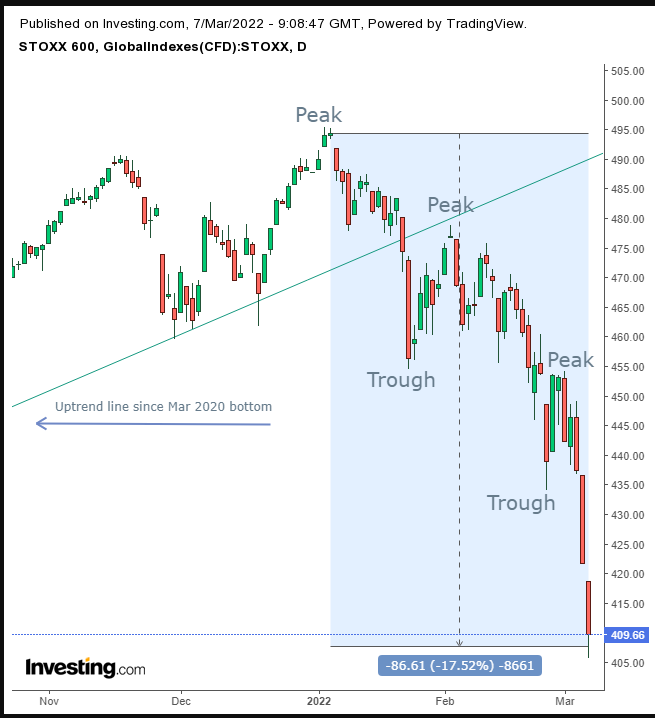
The pan-European index is at its lowest point since Feb. 26, 2021, and is now in a short-term peak-and-trough downtrend.
In the UK, the FTSE 100 was down 1.6%, its third straight day of losses, totaling -7.6%. Like the STOXX 600, the FTSE 100 has fallen for four consecutive weeks.
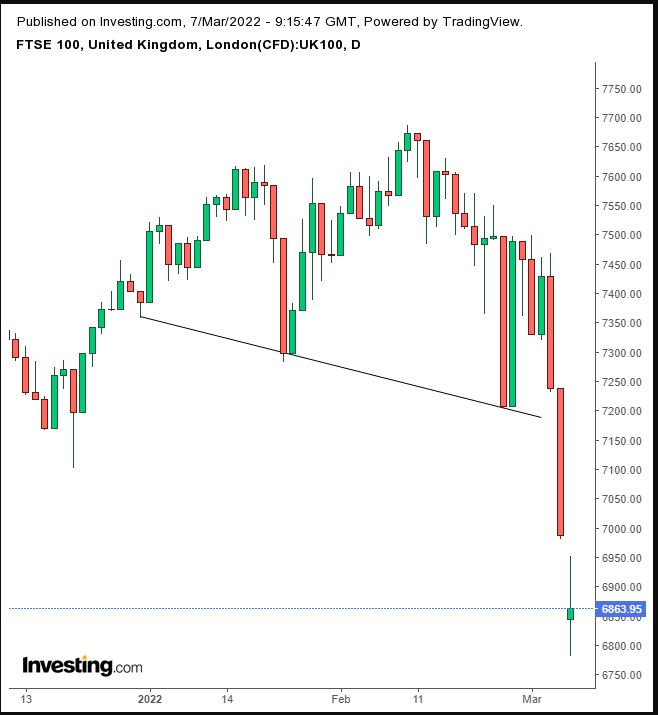
The British benchmark completed a down-sloping H&S top, a pattern indicating demand is too weak to form a proper right shoulder.
The DAX is down too, off 3.25%, bringing the depth of the German index's decline since its previous peak on Jan. 5 to -22.2%, well within bear market territory.
Germany is Europe's largest economy and is considered the economic steam engine of the Eurozone.
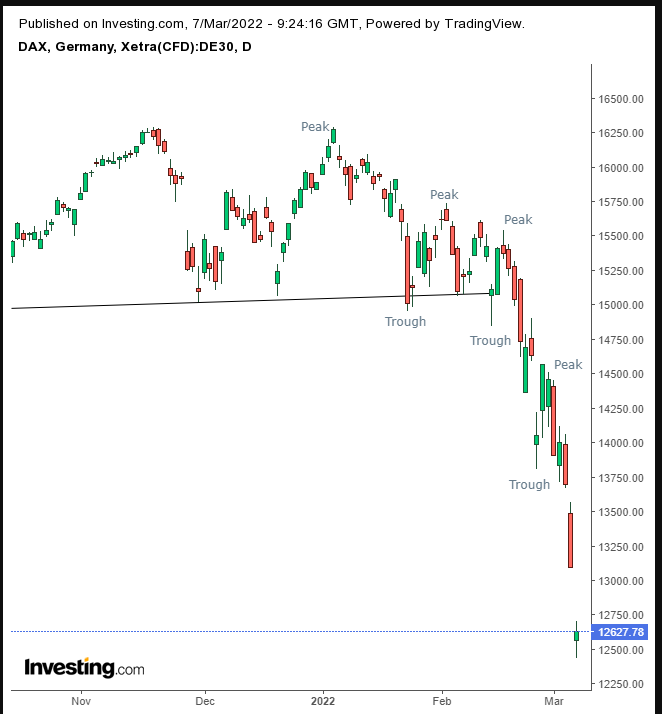
The index topped out on Feb. 21 and since then has established a short-term peak-trough downtrend.
Earlier, Asian shares—which all traded in the red on Monday—were also headed toward bear markets.
The MSCI Asia Pacific index fell 1.7%, bringing its total slide from its Feb. 17, 2021 record to -19.07%, just shy of a bear call.
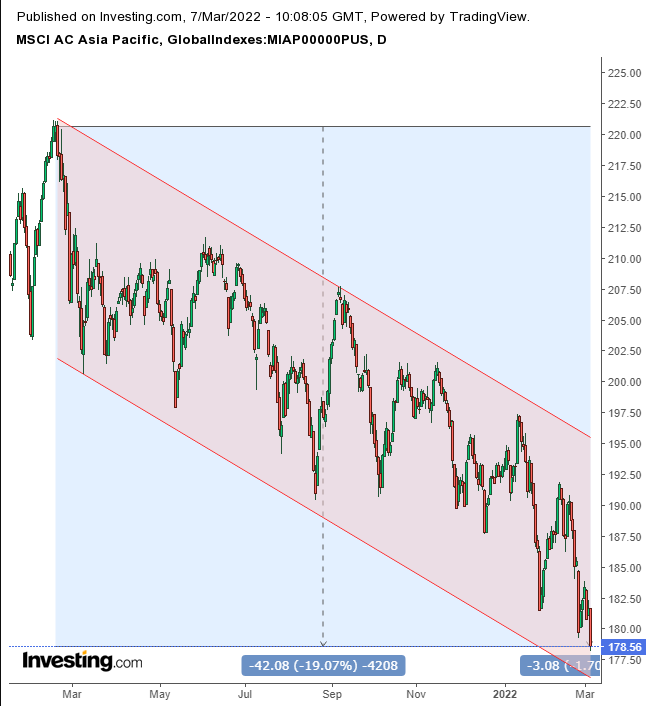
The index reached the bottom of a falling channel, which increases the potential for a rebound, at least toward the channel top.
Hong Kong's Hang Seng fell 3.9% to its lowest level in six years, bringing the total decline from its Feb. 17 peak to -32.35%, deeply into a bear market. Japan's Nikkei 225 plunged 2.94% today, bringing its overall decline since the Sept. 14 high to -17.77%.
An advance of 10-year Treasuries stalled, turning into a selloff, pushing yields back above 1.7%. Fundamentally, traders are weighing current risks with spiking inflation and the likelihood of a US rate hike. There is also a technical explanation.
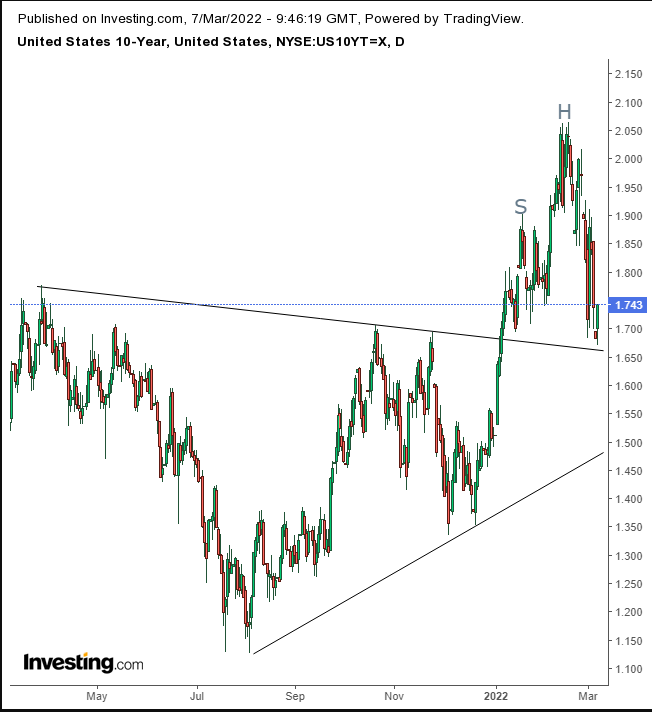
Yields found support (or Treasuries, which are negatively correlated to yields, found resistance) at the top of a large symmetrical triangle. Just be careful of a possible small H&S top in the making, utilizing the triangle's top as a neckline. We're choosing to bet on the much larger symmetrical triangle.
The dollar climbed for the fifth of six days.
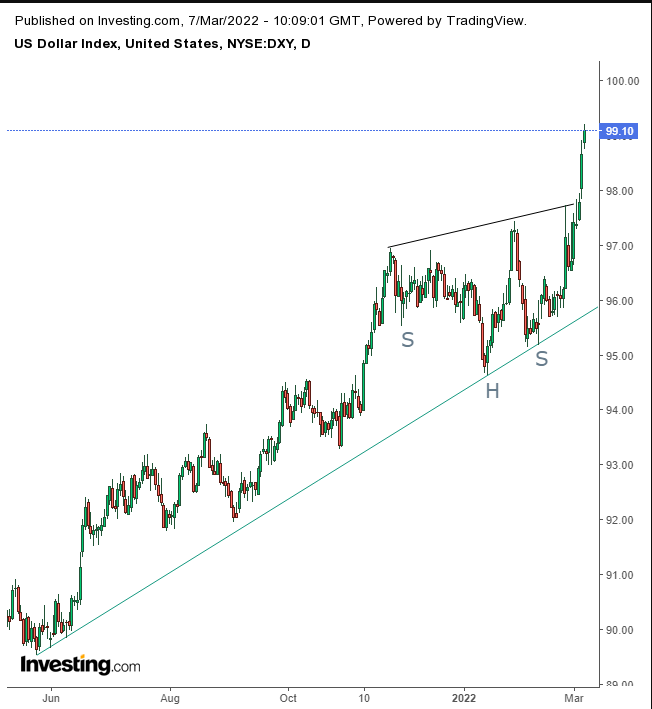
The greenback is completing an H&S continuation pattern.
Gold opened 1.3% higher, then extended its advance to 2.03%, pushing past the $2000 mark, but settled, as of the time of writing, beneath it, up 1.5%, the highest point for the precious metal since Sept. 1, 2020.
Bitcoin pared a 2.19% decline to -0.05%, proving once again that it is not a safe haven.
Crude oil opened 7.95% higher but trimmed the rally to 6.55%, as of now, to its highest level since Aug. 1, 2008.
Surging energy costs threaten to upend global growth and may even trigger a recession. Secretary of State Antony Blinken announced that the US and its allies are considering coordinating an embargo against Russia. The US could also decide to go it alone, as lawmakers there are urging a ban.
Grains, metals, and natural gas also surged. Europe is now exposed to higher inflation, given that the continent relies upon Russian energy. The euro was down 9.7% for the fifth day in a row to its lowest since May 2020 and we expect the decline to continue.
